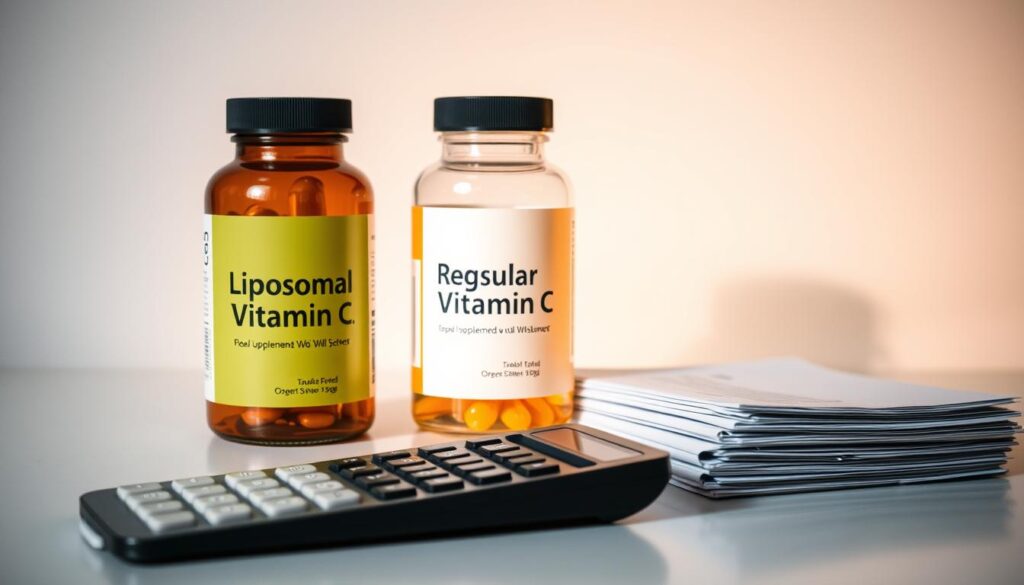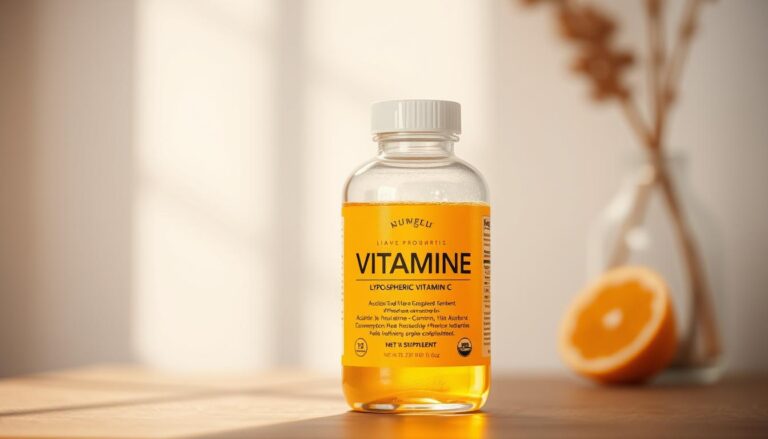Liposomal Vitamin C vs Regular: What’s the Difference?
You’ve probably heard that vitamin C is key for a strong immune system and good health. A new form, vitamin Cliposomal , has become popular. But what makes it different from regular vitamin C?
When picking supplements, knowing the difference between liposomal and regular vitamin C is important. It helps you choose wisely.
Table of Contents
Understanding Vitamin C and Its Importance
Vitamin C is key to a healthy diet. It supports the immune system and helps absorb nutrients. It’s vital for our bodies.
The Role of Vitamin C in Your Body
Vitamin C is crucial for fighting off infections and diseases. It helps make collagen, which is important for skin and bones. It also helps our bodies use iron better.
Vitamin C also protects cells from damage. This helps lower the risk of chronic diseases. It’s a powerful antioxidant.
Common Sources of Vitamin C
You can find vitamin C in many foods. Citrus fruits like oranges and lemons are great sources. Strawberries and kiwis are also good. Bell peppers, broccoli, and spinach are other options.
| Food | Vitamin C Content (mg per serving) |
|---|---|
| Orange | 70 |
| Strawberries (1 cup) | 150 |
| Bell Pepper (1 cup) | 125 |
While diet is enough, supplements can help too. Knowing about vitamin C’s benefits is important for your health.
Traditional Vitamin C Supplements Explained
Vitamin C is key for our health, but traditional supplements have their limits. You might have seen different types like tablets, capsules, and powders. But, how well they work can vary a lot.
Forms of Regular Vitamin C
There are many ways to take vitamin C supplements. Each type has its own benefits. Here are a few:
- Tablets: Easy to take and swallow, tablets are a favorite.
- Capsules: Great for those who prefer not to eat with food.
- Powders: Mix with water or drinks for a flexible dose.
Bioavailability Challenges
One big problem with traditional vitamin C supplements is bioavailability. This means how well our bodies can use the nutrient. Several things can affect how well we absorb it:
| Factor | Impact on Bioavailability |
|---|---|
| Gastrointestinal Health | A sick gut can make it harder to absorb vitamin C. |
| Dose Timing | Too much at once can lower how much we absorb. |
| Food Interactions | Some foods can help or hurt how well we absorb vitamin C. |
Absorption Limitations
How well our bodies absorb vitamin C from supplements is limited. This is because of our natural limits and how the supplement is made.
Knowing these limits helps us get the most from vitamin C supplements. By understanding the challenges, we can choose better supplements for our needs.
What Is Liposomal Vitamin C?
Have you heard of liposomal vitamin C? It’s different from regular vitamin C. This form uses tiny liposomes to carry the vitamin. These liposomes make vitamin C more stable and easier for the body to use.
The Science Behind Liposomal Technology
Liposomal technology wraps nutrients in tiny bubbles called liposomes. These bubbles are made of lipids, similar to cell membranes. This makes them very friendly to our bodies.
“The use of liposomes for nutrient delivery is a big step forward in nutrition,” say experts. It keeps vitamin C safe from being broken down in the stomach.
How Liposomes Protect and Deliver Nutrients
Liposomes shield vitamin C from the stomach’s harsh environment. They keep it safe from acid and enzymes. This way, vitamin C gets into cells more easily, without losing its strength.
When liposomes meet cell membranes, they release vitamin C inside. This enhanced delivery means more vitamin C gets to where it’s needed. This could lead to better health.
Some main benefits of liposomal delivery are:
- Improved bioavailability
- Enhanced cellular uptake
- Protection from degradation
Thanks to liposomal technology, vitamin C reaches cells more effectively. This could improve our health.
Absorption Battle: Liposomal Vitamin C vs. Regular Supplements
It’s important to know how liposomal and regular vitamin C supplements work. The right choice depends on how well your body absorbs them. This affects how well they work.
Bioavailability Comparison
Liposomal vitamin C beats regular supplements in bioavailability. Liposomal encapsulation keeps vitamin C safe from stomach acid. This means more of it gets into your blood.
- Liposomal vitamin C: Higher bioavailability due to protective liposomal coating
- Regular vitamin C: Lower bioavailability due to degradation in the digestive system
Intestinal Absorption Differences
How vitamin C is absorbed in the intestines matters a lot. Liposomal vitamin C gets absorbed better because of its special delivery system. This helps it get into cells more easily.
Studies have shown that liposomal vitamins, like vitamin C, get absorbed better. This is because they’re protected from the stomach’s harsh conditions.
Scientific Studies on Absorption Rates
Many studies have looked at how well liposomal and regular vitamin C are absorbed. One study found that liposomal vitamin C gets into the blood better than regular vitamin C.
When picking a vitamin C supplement, think about how well it’s absorbed. Liposomal vitamin C is more efficient. This could mean better health benefits for you.
Benefits of Liposomal Vitamin C
Liposomal vitamin C uses special technology to deliver vitamin C better. This makes it a top choice for those wanting to get more vitamin C. It has many benefits that make it stand out.
Enhanced Immune Support
Liposomal vitamin C boosts your immune system. It helps your cells get the vitamin C they need. This keeps you safe from sickness and infections.
Reduced Digestive Discomfort
Liposomal vitamin C is gentle on your stomach. It doesn’t cause the stomach upset that some vitamins can. This makes it great for people with sensitive stomachs.
Higher Cellular Uptake
The way liposomal vitamin C is made helps your body use more of it. It protects the vitamin from being broken down in your stomach. This means your cells get more of the vitamin C they need.
Potential for Lower Effective Dosages
Because it’s so easily absorbed, you might need less liposomal vitamin C. This could save you money and reduce the chance of side effects from too much vitamin C.
In short, liposomal vitamin C has many advantages. It supports your immune system, is easy on your stomach, and your body absorbs it better. It might even let you take less of it to get the same benefits. If you’re looking for a good vitamin C supplement, liposomal is a great option.
Dosage Recommendations and Usage Guidelines
To get the most from vitamin C, knowing the right dosages is key. There are different types of vitamin C supplements. The best amount can change a lot between regular and liposomal vitamin C.
Regular Vitamin C Dosing
The amount of vitamin C you need depends on your age, sex, and more. Adult men need about 90 mg a day, while women need 75 mg. Smokers should add 35 mg a day because smoking harms the body.
For supplements, you can take 500 mg to 2,000 mg of regular vitamin C daily. But, taking more than 2,000 mg can cause stomach problems like diarrhea.
Liposomal Vitamin C Dosing
Liposomal vitamin C is better absorbed than regular vitamin C. Research shows it works well at lower doses. You usually take 500 mg to 1,000 mg of liposomal vitamin C each day.
Some studies found that just 250 mg of liposomal vitamin C can boost your immune system. The special coating in liposomal vitamin C helps it get absorbed better.
Timing and Administration Tips
When you take vitamin C matters for its effectiveness. For regular vitamin C, taking it in smaller doses throughout the day is best.
For liposomal vitamin C, taking it on an empty stomach might help it absorb better. But, always follow what the maker says. Some products are made to be taken with food to avoid stomach upset.
Key Considerations:
- Always talk to a healthcare professional before starting any supplements.
- Keep track of all vitamin C you get, from food and other supplements.
- Watch how your body reacts to vitamin C supplements and adjust as needed.

Top Liposomal Vitamin C Supplements on the Market
There are many liposomal vitamin C supplements available, from high-end to affordable choices. Finding the right one can be tough.
Premium Options
Premium liposomal vitamin C supplements use top-notch ingredients and advanced methods. Brands like Quicksilver Scientific and Thorne Research stand out for their quality. They offer better absorption and strength, but cost more.
For premium options, check for third-party tests and certifications. These ensure the product is pure and works well. They’re perfect for those who value quality and are ready to invest in their health.
Budget-Friendly Choices
There are also affordable liposomal vitamin C supplements. Brands like Doctor’s Best and Now Foods offer good deals without sacrificing quality. This makes liposomal vitamin C more accessible to more people.
When picking budget-friendly options, make sure to check the ingredients and how they’re made. Look for clear labels and information on where and how the product is made.
What to Look for in Quality Products
When choosing a liposomal vitamin C supplement, consider a few key things. Quality products should clearly list their ingredients and how they’re delivered. They should also have third-party tests to prove their purity and strength.
Other important things to think about include the maker’s reputation, what others say about it, and any scientific studies backing it up. By looking at these, you can pick a supplement that really meets your health needs.
Cost Comparison: Is Liposomal Vitamin C Worth the Price?
Liposomal vitamin C is known for better absorption. But is it worth the extra cost? It’s important to compare its price with regular vitamin C supplements.
Price Analysis of Regular vs. Liposomal Forms
Vitamin C supplements vary in price based on form, brand, and quantity. Regular vitamin C is cheaper, costing between $5 to $15 for 60 to 100 tablets or capsules. Liposomal vitamin C, however, costs between $20 to $50 for the same amount, with some brands even more expensive.
Here’s a price comparison in a table:
| Product Type | Average Price | Quantity | Price Per Serving |
|---|---|---|---|
| Regular Vitamin C | $10 | 100 capsules | $0.10 |
| Liposomal Vitamin C (Basic) | $25 | 30 servings | $0.83 |
| Liposomal Vitamin C (Premium) | $40 | 30 servings | $1.33 |
Value Consideration: Absorption vs. Cost
Liposomal vitamin C is pricier but offers better absorption. This could make it worth the extra cost. Research shows liposomal delivery boosts vitamin C absorption, making it more effective.
When looking at value, consider the cost per effectively absorbed dose. For those with poor digestion or high nutritional needs, liposomal vitamin C’s better absorption might be a good investment.
In summary, whether liposomal vitamin C is worth it depends on your health needs and budget. If you value maximum absorption and are willing to spend for better health, it might be the right choice for you.

Conclusion
Now you know the difference between traditional and liposomal vitamin C supplements. Liposomal vitamin C is better absorbed by your body. It keeps vitamin C safe from being broken down, so more of it gets to your cells.
Liposomal vitamin C helps boost your immune system and can ease stomach issues. It also gets absorbed more easily by your cells. Even though it costs more, you might need less of it, making it a smart health choice.
For the best liposomal vitamin C, choose products with top-notch technology. Talk to a healthcare expert to find the right amount for you. By picking a high-quality liposomal vitamin C, you’ll get the most out of this important nutrient and improve your health.



